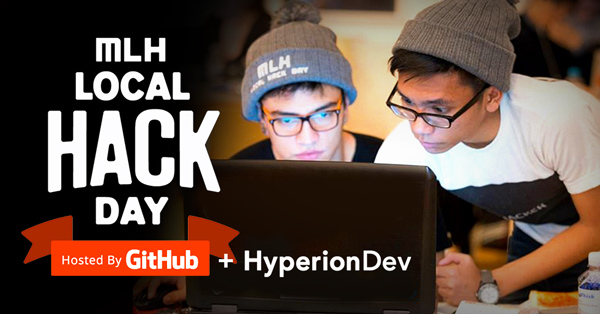Imagine if you could solve a problem in a few hours with a group of people you’ve just met. Would you be interested? If yes, then perhaps you should consider signing up for a Hackathon. ‘It’s really satisfying,’ says Gareth Dwyer, software and operations developer at HyperonDev, ‘to set aside a day or two to build something from nothing, even if the completed project is somewhat unpolished. No one really knows what’s possible in such a short time, so it’s a great challenge to see if you can achieve something worthwhile in the strict time limit.’
MLH Local Hack Day + HyperionDev
You can join a global hackathon this Saturday 2 December in Cape Town. HyperionDev is partnering with MLH (Major League Hacking) for their Hackathon Day.
Who it is for:
Any programmers, designers or creators who want to come and build a cool tech product in a limited time frame. Come with your pre-existing team or on your own to meet and work with like-minded people.
What you will do:
You’ll build a tech product such as a mobile app, website, chatbot or an API. The Hackathon starts at 9am and continues for 12 hours. Our judges will select a winning team based on the functionality, implementation, potential, and social impact of each creation.
Pizza and drinks will be provided.
Date: 2 December
Time: 9am
Place: HyperionDev, 3rd Floor, Block B, Woodstock Exchange
Sign up on FB or here. HyperionDev will provide the venue, food, internet and some cool swag.
What is a Hackathon?
Essentially, says Hackathon Guide, hackathons are about ‘creative problem solving’. That means they don’t have to be technical in nature, although they frequently are. At its most basic, it’s an event of any duration where people come together to solve problems. And the problems can be really way out. At the ‘Stupid Shit No One Needs & Terrible Ideas Hackathon’ some creations included: a 3D cheese printer, a beer selfie stick (which pours beer on you as you’re taking a selfie) and Hypochondriapp, which diagnoses you with the worst possible disease for any symptoms you might be experiencing.
Most hackathons, however, last between 12 and 48 hours. And they are constructive in nature. The team frequently builds a working prototype for a product, usually an app, although some teams build actual hardware devices. Says Dwyer: ‘I like the feeling of having built something. Day-to-day, most of us developers are working on fixing small issues, developing smaller features etc., but at a hackathon you can really build something big.’
There are other benefits as well. ‘One of the main reasons I’ve enjoyed hackathons,’ says Dwyer, ‘is the social or networking angle. I’ve met some cool people and the experience of working with three or four people for 12 or 24 straight hours, including the tensions, frustrations, etc., normally results in a long-lasting bond’” In fact, the hackathon community is very active online, too, says Forbes website. Check out the Facebook group Hackathon Hackers, which has over 50 000 member, or Hacker News, the Reddit for hackers.
Why attend a Hackathon?
Tim Fogarty, the EU commissioner for MLH (Major Legaue Hacking), a global student hackathon league, lists these additional reasons:
Learning:
‘You’ll gain more practical knowledge in one hackathon than from a month of lecturers,’ he says. ‘(They) are super-condensed learning experiences.’ Not only will you learn the technical aspects of a project like APIs, frameworks libraries, version control, testing, etc. (stuff software engineers know), but you’ll also learn about idea generation, working with others, and managing a project. In fact, if you want to learn how to code, go to a hackathon!
Cos it’s cheap:
Hackathons frequently provide food, drink and cool stuff. Generally, you’re only paying for travel.
An opportunity to demonstrate your skills:
It’s very satisfying to do something at which you’re proficient.
Make that idea a reality:
Here’s your chance to make that app you’ve thought about often. And some fantastic ideas have emerged from hackathons. The social messaging app Group Me, which sold to Skype for $85M!, was originally hacked at Tech Crunch’s HackDay, reports Forbes.
Let’s say you’ve found a hackathon and signed up. Here are some tips for hackathon success, from Appsembler:
Make sure your expectations are realistic:
Pragmatically, in 12-48 hours, you’ll be lucky to build something that works and can be demoed. No problem with thinking big, but start small. Err on the side of limited functionality rather than adding functionality. In tech-speak, this is known as a minimal viable product (MVP) – a product with enough features to satisfy early customers and to get feedback for later iterations.
Teams that are diverse: Ideally, you want people with different competencies, such as developers, creative designers, people from business. Most teams consist of 2-5 members.
Prepare beforehand: Try and think of your product beforehand. Also, if you can, understand how the libraries you’re planning on using have been put together. This is so that you won’t have to spend your valuable time researching how to use libraries or 3rd party APIs that you may need for your product.
Work backwards:
Imagine your perfect demo and work backwards from there. Think about the functionality and the UI screen you want to show your prospective audience.
You need a version control system like Github:
When you’re working on code, each time you implement a new feature, fix a bug, or write modified code, you want those changes to be recorded somewhere. It’s much easier to roll back a version than to fix a bug that is embedded in the code.
Remember to take frequent breaks:
Creating something new is tiring. Take breaks.


